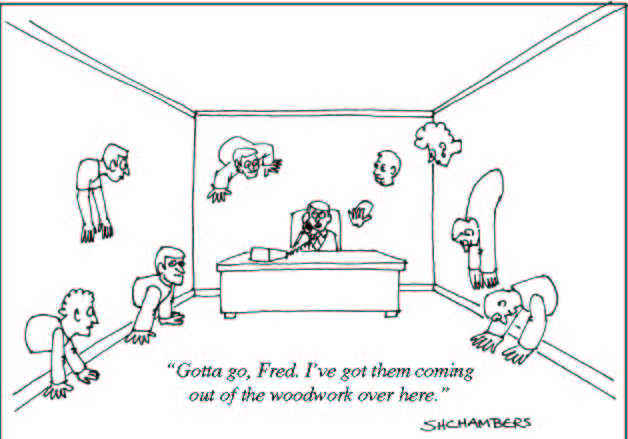supreme news
court rules on ada: are you disqualified yet?
The trouble with bringing news to our readers every two months is that news gets older on a daily rather than a bimonthly basis. Here’s very bad news from the U.S. Supreme Court which announced a decision unfavorable to many of our readers on January 8, long after the Mouth had gone to press.
Forbes magazine, never a friend to folks who don’t belong to country clubs, has described the Americans with Disabilities Act as “vexing,” and employees who bring suits against their employers under the ADA as “slackers.” Then came January 8, and Forbes got a chance to gloat, big time.
A unanimous decision of the U.S. Supreme Court in Toyota v. Williams
held that from now on, employers will not be required to ![]() furnish reasonable accommodations
furnish reasonable accommodations ![]() to a person unable to perform the
to a person unable to perform the ![]() physical tasks related to her or his
physical tasks related to her or his ![]() job. If people are able to do house-hold
chores and take care of their own personal hygiene, the Court ruled, they
are not entitled to the ADA’s protection against job discrimination.
To be disabled, it said, one must be unable to perform activities
“such as walking, seeing, and hearing.”
job. If people are able to do house-hold
chores and take care of their own personal hygiene, the Court ruled, they
are not entitled to the ADA’s protection against job discrimination.
To be disabled, it said, one must be unable to perform activities
“such as walking, seeing, and hearing.”
We estimate that this ruling disqualifies more than half of the 56 million American citizens who to-day claim citizenship in the Disability Nation.
Congressman comments
Rep. Steny Hoyer, who in 1989 and 1990 oversaw its deliberation in the U.S. House of Representatives, wrote an opinion piece for the Washington Post of January 20. What follows are excerpts from that article.
“Justice O’Connor cited a phrase or context to invoke ‘what Congress intended.’ Then she and her fellow justices unanimously narrowed the scope of the ADA and ordered a lower court to reconsider a decision that allowed a woman suffering from carpal tunnel syndrome to be excused from certain tasks at a Toyota Motor plant in Kentucky. She wrote that a disability must substantially limit major activities ‘that are of central importance to most people’s daily lives.’
“... as the congressman who shepherded the legislation through the House of Representatives, I believe that the ‘intent of Congress’ was clearly more expansive than Justice O’Connor’s ruling would suggest....
“Is this what we had in mind when we passed the ADA — that lawyers for business and individuals should spend time and money arguing about whether people can brush their teeth and take out the garbage? Not at all....
“When we wrote the ADA, we estimated that 43 million people would be covered. That seemed like a lot and showed we intended the law to be broad rather than narrow. Until the ADA passed, the average guy thought of a disability as some-thing that meant you couldn’t walk, or see, or hear. Our broader estimate helped build support for the legislation.
“Now, however, O’Connor has cited that figure to say that carpal tunnel and other conditions might push the national total of people protected under the ADA far beyond 43 million and that Congress did not intend that.”
SEE ‘THE WOODWORK EFFECT’ PAGE 18

MOUTH MARCH -APRIL 2002 PAGE 7
